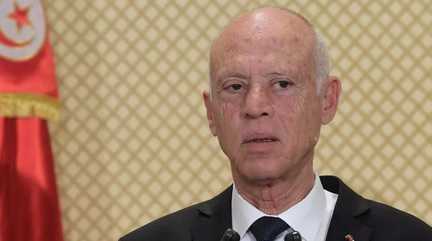
07 Apr 2023; MEMO: Tunisia's President Kais Saied stressed on Thursday that his country "is not for sale" and that national decisions must be "based on the will of the people." He accused unnamed internal factions of attempting to "sell Tunisia to foreign interests." His remarks came during a media statement on the sidelines of commemorating the death anniversary of former Tunisian President Habib Bourguiba (1956-1987).
Saied also accused certain unnamed parties of throwing themselves into the arms of foreign powers, suggesting that their sense of belonging to the nation was lost. He added that these parties suffer from constitutional delusions and scramble for power, as the late President Bourguiba once said. He referred to recent rumours about his whereabouts and health, debunking claims that he had died, revived, or travelled to Italy.
The President emphasised that he and his government do not fear death and will die for Tunisia. However, they are concerned about the constitutional delusions and claims of a vacancy for the presidency.
On Monday, Saied announced that there is no vacancy for the presidency and warned that promoting such rumours threatens civil peace. Since 23 March, the president has been absent from public appearances, raising questions about his health. The opposition National Salvation Front demanded that the government disclose the reasons for the president's absence since March 23.
OPINION: As racist attacks unfold, the President points to foreign funding
Tunisia has suffered a severe political crisis since 25 July, 2021, when Saied began implementing exceptional measures, including the government's dismissal, the dissolution of parliament and the judiciary council, and the issuance of presidential decrees. Some Tunisian forces regard these actions as a "coup" against the constitution, while others view them as a "correction" of the 2011 revolution that toppled then-President Zine El Abidine Ben Ali (1987-2011).
Saied stated that he does not agree with the IMF's proposal to cut subsidies, as Tunisia faces pressure to reach a final agreement to resolve its financial and economic crisis. The president rejected external impositions that would lead to further impoverishment. The IMF demands real guarantees to implement a reform package before disbursing the first tranche of a $1.9 billion loan agreement, including gradually reducing the subsidy system, reforming public institutions, and controlling the wage bill.
Saied opposes the reduction of subsidies and proposes directing them to deserving recipients or imposing levies on manufacturers who consume subsidized materials. He warned that civil peace is not a game or a trivial matter, recalling the "Bread Revolution" of 1984 in Tunisia when the government lifted subsidies on grain products, leading to street clashes and casualties.
When asked about alternative solutions in case of a failure to reach an agreement with the IMF, Saied said, "We must rely on ourselves." Tunisia's international partners are pressing for a deal with the IMF to prevent a potential financial collapse as many migrants leave the country's shores for Italy.




